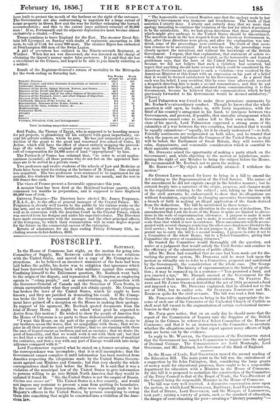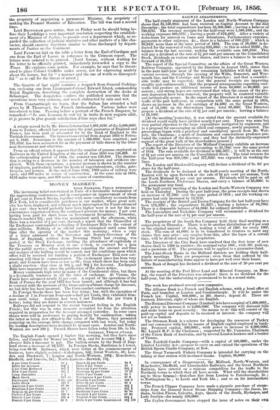POSTSCRIPT.
SATURDAY.
In the House of Commons last night, on the motion for going into Committee of Supply, Mr. ROEBUCK called attention to our relations with the United States, and moved for a copy of Mr. Crampton's in- structions. As he believed an incorrect statement of the facts had been laid before the public, his desire was to enlighten that ignorance which had been fostered by holding back what militates against this country. Confining himself to the Enlistment question, Mr. Roebuck went back to the origin of the dispute, and represented Mr. Crampton as employing agents to " crimp people," and as endeavouring, in conjunction with the Governor-General of Canada and the Governor of Nova Scotia, to obtain surreptitiously what they could not obtain openly. Mr. Crampton has broken the laws of the United States, which he ought to have known; and they are justified in demanding his recall. If Mr. Cramp- ton broke the law by command of the Government, then the Govern- ment have palmed off a deception on the House in making their apology. In support of his agument, Mr. Roebuck quoted documents from the trial of Henry Hertz. It might be asked what good he expected to derive from this motion ? He wished to show the people of America that the House of Commons is no party to these dishonourable proceedings.
"I want this House, on the part of the people of this country, to say to our brethren across the water, that we sympathize with them ; that we re- joice in all their greatness and good fortune ; that we are running with them the race of improvement as brethren and not as enemies ; that we desire the good of humanity, and that we would work it out with their aid ; but that we feel that a war with America would retard the advancement of mankind for centuries, and that a war with any part of Europe would sink into insig- nificance compared with it."
Lord PALMERSTON repeated what he stated on a former occasion, that the correspondence was incomplete ; that it is still incomplete ; that the Government cannot complete it until information has been received from America respecting the allegations made by the United States Govern- ment against our Minister and Consuls; but that very shortly the whole correspondence shall be laid before the House. It is said that it was a violation of the municipal law of the United States to give information to persons willing to go into British North America that they would be erred if found fit. " Sir, the United States is not the empire of Russia. Civitas non career est." The United States is a free country, and would not impose any restraint to prevent a man from quitting its boundaries. In the course of these transactions, offers were repeatedly made to her Majesty's officers in the United States, by persons conspiring to entrap them into something that might be construed into a violation of the Ame- rican law. " The honourable and learned Member says that the apology made by her Majesty's Government was insincere and treacherous. The truth of that assertion I utterly deny. I utterly and entirely deny that we made that apology intending to continue the violation of the law for which it professed to be the satisfaction. Sir, we had given directions that those proceedings which might give umbrage to the United States should be discontinued. The assertion made in the last despatch from the American Government is that, after these directions were given, and after the explanation was ten- dered, some of the proceedings were continued. The truth of that asser- tion remains to be ascertained. If such was the case, the proceedings were clearly against the intentions and without the knowledge of the British Government. I reheat, that that explanation, that statement of orders re- voked, that expression of regret—not regret, as the honourable and learned gentleman sap, that the laws of the United States had been violated, because we did not believe that such a violation had occurred, but regret that anything should have occurred which could be considered by tho American Government to amount to such a violation—was received by the American Minister at this Court with an expression on his part of a belief that it would be deemed satisfactory by his Government. As a proof that such was his belief, I may mention, that he some tune afterwards received a despatch directing him to make a second remonstrance, and that he put that despatch into his pocket, and abstained from communicating it to this Government, because he believed that the communication which he had previously forwarded to his Government would be deemed satisfactory." (Cheers. Palmerston was forced to make these premature statements by Mr. Roebuck's extraordinary conduct. Though he knows that the whole question is still open, he rushes in, with hasty impatience, with the brief of his country's antagonist in his hand, to interpose between two Governments, and prevent, if possible, that amicable arrangement which Governments cannot come to unless left to their own action. At the close of his speech, Lord Palmerston expressed a strong sense of the calamities of a war between the two countries, but insisted that it would be equally calamitous—" equally, let it be clearly understood "—to both. Friendly sentiments are reciprocated on both sides, and he trusted that when the papers are laid before the Congress of the United States, as they will be before the Parliament of Great Britain, they will receive the calm, dispassionate, and reasonable consideration which is essential to their amicable settlement.
Mr. DISRAELI seized the opportunity of making a party attack on the Government; and, while objecting to the motion as injudicious, main- taining the right of any Member to bring the subject before the House. He recommended Mr. Roebuck not to press the motion.
Mr. ROEBUCK—" My object is sufficiently attained : I withdraw the motion."
Sir GEORGE LEWIS moved for leave to bring in a bill to amend the Act relating to the Superannuation of the Civil Service. The nature of the amendment he did not explain except in the briefest manner ; but he entered deeply into a narrative of the origin, progress, and changes made in the regulations relating to the subject ; and, taking up the memorial of the civil servants, he endeavoured to show that its allegations are without foundation, especially in charging successive Governments with a breach of faith in making an illegal application of the funds derived from the deductions. The bill he mentioned in these terms- " I do not propose to make an alteration in the system of deductions. The amendments that I ask the leave of the House to make are limited to altera- tions in the scale of superannuation allowance. I purpose to make it more liberal than the existing scale, and to make it resemble more nearly the old i scale than that which is now in existence. These amendments will be accom- panied with several changes rendering the allowance-fund more liberal to the civil service ; but beyond this I do not purpose to go. If the House should permit me to carry the bill to a second reading, I propose to refer it not to a Committee of the whole House, but to a Select Committee, giving that Committee the power of examining witnesses."
He trusted the Committee would thoroughly sift the question, and arrive at a judgment that would satisfy the Civil Service and conduce to the efficiency of the administration of public affairs.
After Mr. Rica had remarked that no case had been made out for dis- turbing the present system, Mr. DISRAELI said he must look upon the motion as virtually one to refer to a Committee, proposed and sanctioned by the Government, the consideration of the whole case. [Sir George Lewis assented.] The history of superannuation is the history of spolia- tion ; it may be summed up in a sentence—" You promised a fund, and you exacted a tax," Mr. Disraeli sneered at the Government for the smallness of their measure of administrative reform. Sir FRANCIS BA- RING and Sir JAMES GRAHAM denied that the act of 1834 promised a fund and imposed a tax. Mr. DISRAELI explained, that he alluded not to the act of 1834, but to earlier acts. Sir STAFFORD NORTHCOTE and Mr. ROEBUCK spoke for the civil servants. The bill was read a first time.
Mr. FERGUSON obtained leave to bring in his bill to appropriate the in- come of such one of the Canonries of the Cathedral Church of Carlisle as shall next fall vacant to the augmentation of certain ecclesiastical incum- bencies in that city.
Mr. PALK gave notice, that on an early day he should move that the report of the Commission of Inquiry into the Supplies of the British Army in the Crimea be referred to a Select Committee of the House of Commons ; and that it be an instruction to the Committee to ascertain whether the allegations made in that report against many officers of high rank are borne out by the evidence.
In reply to Mr. WARNER, the CHANCELLOR of the Exenuaeza stated that the Government has issued a Commission to inquire into the subject of Decimal Coinage. The Commissioners are Lord Monteagle, Lord Overstone, and Mr. Hubbard, late Governor of the Bank of England.
In the House of Lords, Earl GRAN-emu: moved the second reading of the Education BM. The main point in the bill was the embodiment of a suggestion by Sir John Pakington, that, considering the large grants of money made for educational purposes there ought to be a responsible department for education with a Minister in the House of Commons. By this bill it is proposed to assimilate the construction of the Committee of the Privy Council to that of the Board of Trade, the Vice-President of the Council being the responsible Minister in the louse of Commons.
The bill was very well received. A discursive conversation arose upon the motion, in which Lord MONTEnerz, Earl GREY, Lord ELLENBOROL/GH, the Earl of DERBY, Lord BROUGHAM, and the Marquis of LAresDOWNE, took part ; raising a variety of points, such as the standard of education, the danger of over-educating the poor—creating a "literary peasantry "— the propriety of appointing a permanent Minister, the propriety of making the Premier Minister of Education. The bill was read a second time.
Lord BROUGHAM gave notice, that on Friday next he should bring be- fore their Lordships a very important resolution respecting the establish anent of a Minister of Justice, to preside over a department which, as re- garded the collection of judicial statistics and other matters of a like cha- racter, should exercise functions similar to those discharged by depart- ments of Justice on the Continent.
Lord PANMURE laid on the table a letter from the Earl of Cardigan and one from the Earl of Lucan in reference to the Crimean report. The letters were ordered to be printed. (Lord Lucan, without waiting for his letter to be officially printed, immediately forwarded a copy to the Times. He explains some points. For example, he says that he threat- ened to place Colonel Griffiths under arrest, not for expressing anxiety about the horses, but for " manner and the use of words so disrespect- ful " as to call for the threat of arrest.]



























 Previous page
Previous page